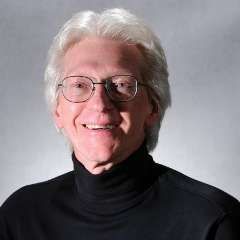To close out its 78th year, Prague Spring turned to an old friend. Veteran conductor Christoph Eschenbach first appeared at the festival in 1968 as a piano soloist. After moving full-time to the podium, he returned for some monumental challenges, including a performance of Mahler’s “Symphony of a Thousand” at a sports arena in 2011 that required Eschenbach to conduct choral singers in the far reaches of the uppermost seats from his spot on the floor, a small miracle that he pulled off with aplomb.
Given his facility with choruses, it was not surprising that the strongest voice in this appearance belonged to the Prague Philharmonic Choir. Nor was it atypical to see Eschenbach knit together a disparate program of Ligeti, Brahms and Beethoven with the Czech Philharmonic. Many conductors can do those pieces, but very few could do them back-to-back with the high level of quality and integrity that Eschenbach consistently brings to performances.
Ligeti’s Atmosphères was an expert realization of the composer’s quest to create soundscapes free of conventional forms. Under Eschenbach’s baton, the series of tones and textures had depth and precision, with knife edges on the sonorities and an electronic hum in the sonics. Individual players melted into dense walls of sound that rose and fell like measured breathing. Rather than abstract, the piece came off as bold and gripping.
The Prague Philharmonic Choir came immediately to the fore in Brahms’ Schicksalslied (Song of Destiny), which opened in warm, almost reverent tones that caught fire the moment Eschenbach cued the singers. Their vocals were incredibly rich, lush at times, with detailed layers of shadings and colors. Even more impressive was the characterization the chorus brought to the poetry, singing of heavenly joys and earthbound sorrows with the kind of emotion and nuance normally heard only from individual singers, rarely from a large group. Credit for that goes to choirmaster Lukáš Vasilek, who has built a brilliant ensemble.
Eschenbach’s work with the orchestra also illuminated the text, reflecting the luminous quality of the opening stanza, the gathering tempest that follows and the final hammer blows of human suffering. Throughout all the tranquility and tragedy the music and vocals were finely balanced, with some booming percussion reinforcing the stentorian tones of the final stanza.
Mirroring Eschenbach’s return, Beethoven’s Ninth Symphony resumed its traditional place as the festival finale after a 20-year absence. It was in good hands, with the conductor giving the music grand dimensions and a sense of exuberance – though not unrestrained. Eschenbach’s approach was straightforward and methodical, perhaps overly so in a very deliberate second movement that might have benefited from loosening up a bit. But it allowed the music to unfold organically, with melodies emerging gradually and marvelous touches like a floating quality in the third movement to set up the thundering Ode to Joy.
In that the choir was electric, showering the stage with vocal fireworks. Placed with the choir rather than separately at the front of the stage, the quartet of vocalists were mostly lost amid the tumult. In their solo moments, Czech bass Jan Martiník showed why he has a flourishing career on opera stages in Germany, and Australian Steve Davislim was an engaging tenor when he wasn’t yelling to be heard.

And it was a pleasure to watch Eschenbach, who embodies class and elegance onstage. The grace in his style is reflected in the music, and offers a reminder that histrionics aren’t necessary to elicit a commanding performance. Economy shaped by a wide breadth of experience and understanding is just as good, if not better.


